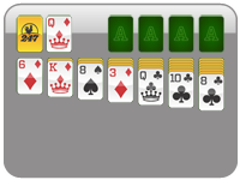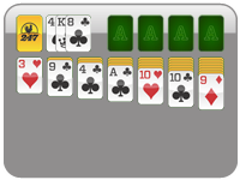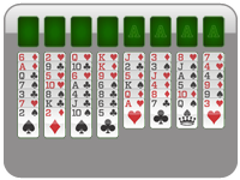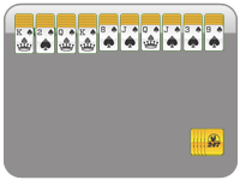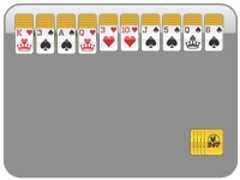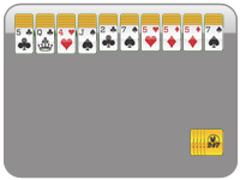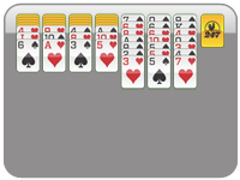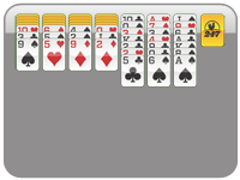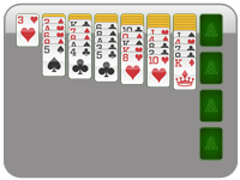Activities for Memory Care Patients: How Solitaire Can Improve Focus

Regarding memory care patients who may need support with everyday tasks but are largely independent, mental stimulation is crucial for maintaining their well-being. By playing simple, engaging games like Solitaire, you’re creating ways for patients to help enhance their focus and increase their cognitive function.
This blog will discuss how Solitaire can help dementia patients and provide tips for making the game more accessible and enjoyable for these individuals. We will also recommend a few other memory-boosting games that would be a great addition to any memory care patient’s routine.
Why solitaire is beneficial for dementia patients

In the next section, we’ll discuss the benefits of Solitaire for memory patients.
1. Encourages Focus and Concentration
Solitaire is not an overly complex game, but it does require attention to details of the cards and strategic thinking to win. Those qualities ensure that it’s a great mental exercise. Memory care patients can strengthen their brain function over time by matching patterns, internalizing rules, and planning moves.
The repetitive, engaging interactions of a game like Solitaire help memory care or dementia patients as they foster a feeling of comfort, security, or familiarity.
2. Supports Cognitive Stimulation Without Overwhelming
Low-pressure, single-player games like Solitaire provide a steady source of mental stimulation without causing frustration. The game’s structure encourages memory care patients to focus, recognize patterns, and make decisions at their own pace. Players can engage their minds without time limits or competition without feeling rushed or pressured to complete the game quickly.
Solitaire gently, accessiblely exercises skills like attention, problem-solving, and logical thinking. Research shows that engaging in games, puzzles, and reading can help improve memory, attention span, and processing speed. Regular mental stimulation keeps the brain active and may support cognitive function over time.
Beyond its cognitive benefits, Solitaire creates a calming, familiar experience. Whether using physical cards or a digital version, the game offers a sense of routine and accomplishment, helping memory care patients stay engaged in a comfortable, low-stress way.
3. Reduces Stress and Encourages Relaxation
Solitaire’s structured, pattern-based gameplay can create a sense of control and predictability for memory care patients. The repetitive actions of sorting and stacking cards provide a calming, meditative effect, helping to reduce anxiety and promote relaxation.
For individuals in memory care, engaging in a familiar, independent activity like Solitaire can offer a soothing routine. The slow-paced nature of the game allows players to focus on one step at a time without pressure, making it a great tool for stress relief.
Studies have shown that video games can help lower stress levels, and digital versions of Solitaire offer the same benefits with added accessibility. Whether playing with physical cards or on a screen, Solitaire provides a quiet, engaging way to support emotional well-being while gently stimulating the mind.
Other Memory-Boosting Games Similar to Solitaire

Solitaire isn’t the only card game beneficial for memory care patients. The following section will go over some other activities for memory care patients with different needs.
1. Matching Card Games
Matching card games can be a simple yet effective way to support memory care for individuals with dementia. These games encourage players to recall the locations of different cards, helping to strengthen short-term memory and cognitive function in a gentle, engaging way.
In games like Concentration, players take turns flipping over cards to find matching pairs. This process encourages the brain to make connections, recognize patterns, and recall past choices. For dementia patients, this type of mental exercise can help maintain cognitive abilities, boost focus, and provide a sense of accomplishment.
Beyond the cognitive benefits, matching games can also be a comforting activity. The structured, repetitive nature of the game creates a predictable routine, which can be soothing for individuals who experience confusion or anxiety. Playing together with caregivers or loved ones adds a social element, fostering connection and engagement in a stress-free setting.
2. Uno (Simplified for Memory Care Patients)
Uno is a great game for memory care because it focuses on color-matching and number recognition, keeping players engaged without overwhelming them. Its simple mechanics help strengthen attention, recall, and decision-making while allowing players to participate at their own pace.
If certain rules feel too complex, you can remove cards like Reverse or Wild Cards to keep the game accessible. This adjustment lets players focus on matching and turn-taking without frustration.
Beyond cognitive benefits, Uno encourages social interaction, which plays a key role in emotional well-being. The game’s bright colors and familiar format create a welcoming experience, while playing together strengthens connections between patients, caregivers, and loved ones. With small adjustments, Uno can remain a fun and meaningful activity in memory care settings.
3. Rummy for Mild Cognitive Impairment
Rummy can support strategic thinking and pattern recognition for individuals in early-stage dementia or later-stage memory care. The game challenges players to organize cards into sets and sequences, keeping their minds active without feeling overwhelming.
Playing in pairs can make the game more accessible and enjoyable. Working with a partner reduces frustration, encourages teamwork, and creates a supportive social experience. Caregivers or loved ones can offer gentle guidance, helping players stay engaged while still enjoying the challenge of the game.
With slight modifications, like simplifying scoring or using fewer cards, Rummy can remain an enjoyable and beneficial activity that stimulates the mind and fosters connection in a relaxed setting.
Free online solitaire for memory care patients – 24/7 Solitaire
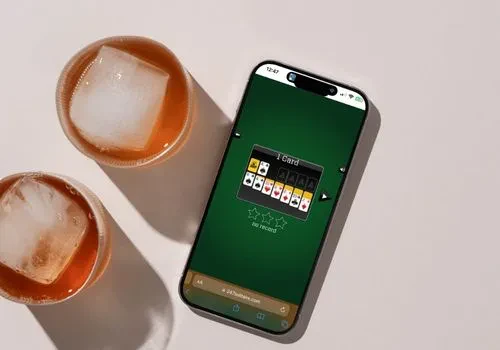
Memory care patients have an easy-to-play, fun activity through solitaire that can increase their focus, provide a reasonable challenge, and reduce their anxiety. For caregivers, think about how your nursing home can introduce Solitaire as a relaxing, stimulating activity. If they want a free online Solitaire platform, check out 247 Solitaire, which offers an intuitive interface, colorful themes, and an endless gameplay loop.
Solitaire Games
More Solitaire Games
More Games
Solitaire News
Disclaimer
DISCLAIMER: The games on this website are using PLAY (fake) money. No payouts will be awarded, there are no "winnings", as all games represented by 247 Games LLC are free to play. Play strictly for fun.

